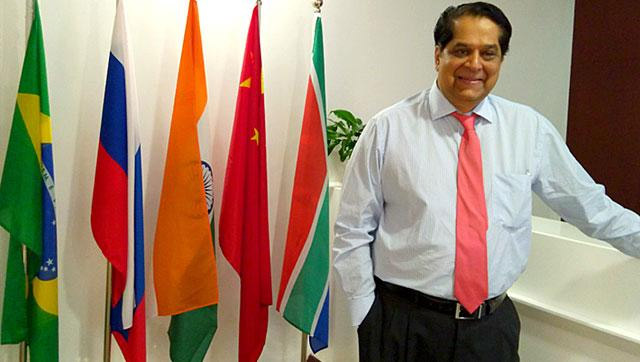Newsroom Media
BRICS Bank is ‘Coming of Age of Developing Countries’: KV Kamath

KV Kamath, the chief of the New Development Bank set up by the BRICS, at his office in the financial district of Shanghai on Monday.
India and China are among the first countries to have shown interest in borrowing money for environment-friendly infrastructure projects from the newly formed development bank initiated by the BRICS (Brazil, Russia, India, China, South Africa), the bank’s president, KV Kamath has said.
The first loans, expected to be sanctioned in April 2016 , will be given in local currencies; for China it will be RMB, for India in Rupee, he said.
“We will do our first loans in local currencies. And, local currencies like the RMB and the Rupee,” Kamath told HT in his new, no-frills office in the financial district of Shanghai.
“We have already started our (loan) appraisals. We now have requests from China . I have been told that India is just forwarding its request. I am sure in the next few weeks we will have other countries following up.”
On the nature of the loan requests, he said it would have to be project-specific.
Kamath said during the recent meeting of the BRICS heads of states in Ufa in Russia, which was attended by Prime Minister Narendra Modi, a broad consensus emerged that the NDB should focus on “green, clean projects”.
The loan request from India is likely to come through and be on his desk this month.
Kamath , often described as a pioneering banker, did not want to comment on the recent stock market volatility in China that has wiped billions of dollars in wealth of investors and on the subsequent devaluation of the Chinese currency.
“Suffice to say that all that happened was 1.9% devaluation. Or 1.9% market adjustment of the exchange rate. Slight movements in exchange rates in developing countries, what impact it could have across the world….observers have taken note,” he said, adding: “I do not think it will have any impact on what we (NDB) do.”
About India’s economy and prospects, he said: “I have been optimistic about India (its economic growth) and I continue to have those views. All developing countries will correct their trajectory to be a growth path.”
Calling the NDB, a collective “coming of age” for developing countries in financial matters, Kamath rejected fears that China, with its financial clout, will influence the fledgling multilateral bank.
“As far as the NDB is concerned, there are five founding members, and each has an equal share and each has equal voice in governance. As of now, that is how it is and that’s how we will look at. As we go along, we will invite new members. That’s looking in the future, otherwise, it is very clear……there is nobody who has a higher or lower authority,” the veteran Indian banker said.
Kamath outlined differences in approach between the NDB and existing multilateral lending banks like the World Bank and the Asian Development Bank.
It signifies the “coming of age of developing countries” and reflects a change in mindset of multilateral development banks because the NDB will understand the “borrowers’ requirement and have dialogue with them” – as opposed to existing institutions.
“Thirdly, what we are aiming for is to do things at a pace. Which for a variety of reasons, existing multilateral development banks are now not able to do. They take two, two-and-half years for appraisal and lending. We want to aim at a six month-schedule,” Kamath said.
Kamath said the NDB will work in a “complementary” manner with the Asian Infrastructure Investment Bank (AIIB), floated by China, of which India is a founding member.
“The need for infrastructure is so big we (the NDB and AIIB) will work in a complementary manner. There is no doubt about that. Second, their focus is primarily on Asia, our focus is all member countries anywhere in the world. NDB has the objective of looking at a wider geography. There is no competition. It is cooperation.”
Original Article :
